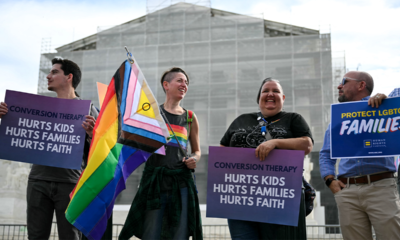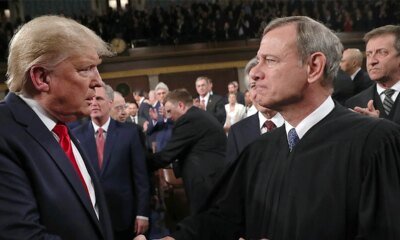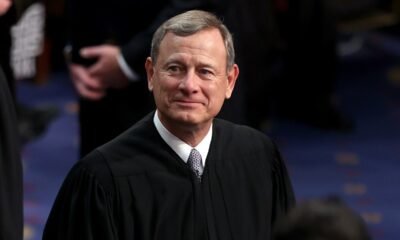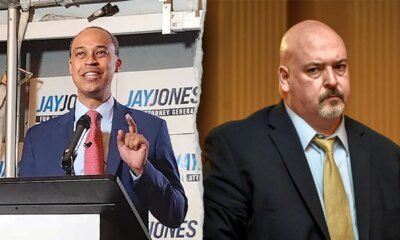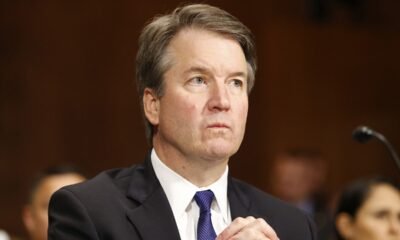INTERNACIONAL
Barrett says justices ‘wear black, not red or blue’ in response to partisan critics in Fox News interview
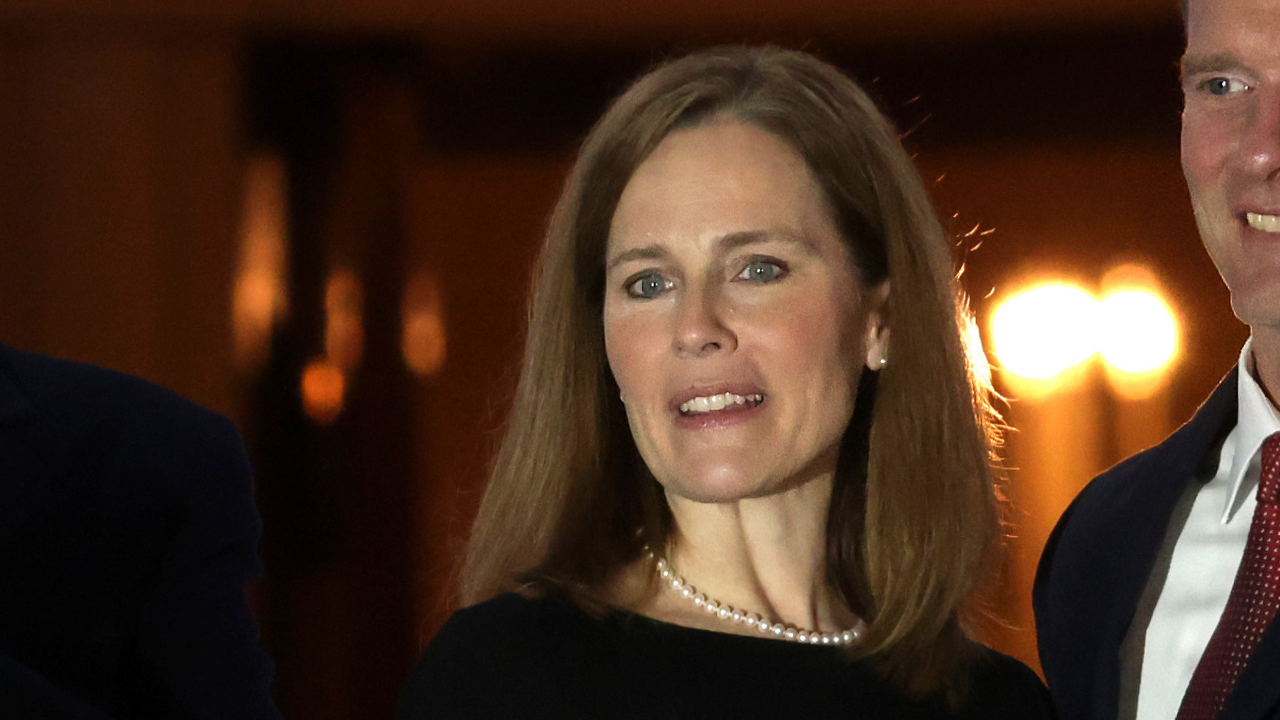
NEWYou can now listen to Fox News articles!
Supreme Court Justice Amy Coney Barrett pushed back against partisan portrayals of the Supreme Court, telling Fox News’ Bret Baier that justices «wear black, not red or blue» and follow the Constitution, not politics.
She appeared on Fox to promote her new book, «Listening to the Law,» and to address public perceptions of the Court’s work and independence.
Barrett stressed that the Court is not divided into partisan teams. She also defended its approach to presidential power, clarified misconceptions about the Dobbs decision, and reflected on her originalist judicial philosophy.
Her book touches on details such as assigned seating, courtroom traditions, and the gap between outside perception and inside reality.
AMY CONEY BARRETT DETAILS BATTLE BETWEEN HER OWN PERSONAL VIEWS AND THE LAW IN NEW BOOK
U.S. Supreme Court Justice Amy Coney Barrett is seen during the ceremonial swearing-in on the South Lawn of the White House after her confirmation to the Supreme Court in October 2020. (Getty Images)
«You know, we don’t wear red and blue, we all wear black because judges are nonpartisan. And the idea is that we are all listening to the law. We’re all trying to get it right. We’re not playing for a team,» she told Baier. «We don’t sit on specific sides of the bench, left and right. You know, we sit in order of seniority.»
Barrett underscored the disconnect between public perception and the Court’s inner workings, noting:
«I often ask new law clerks what surprised you most when you started? And one of the most common answers is the difference between what’s happening on the inside and what people think is happening on the inside.»
JUSTICE BARRETT OPENS UP ABOUT ‘AWKWARD’ START ON SCOTUS, SHADOW DOCKET AND MORE IN FORTHCOMING MEMOIR
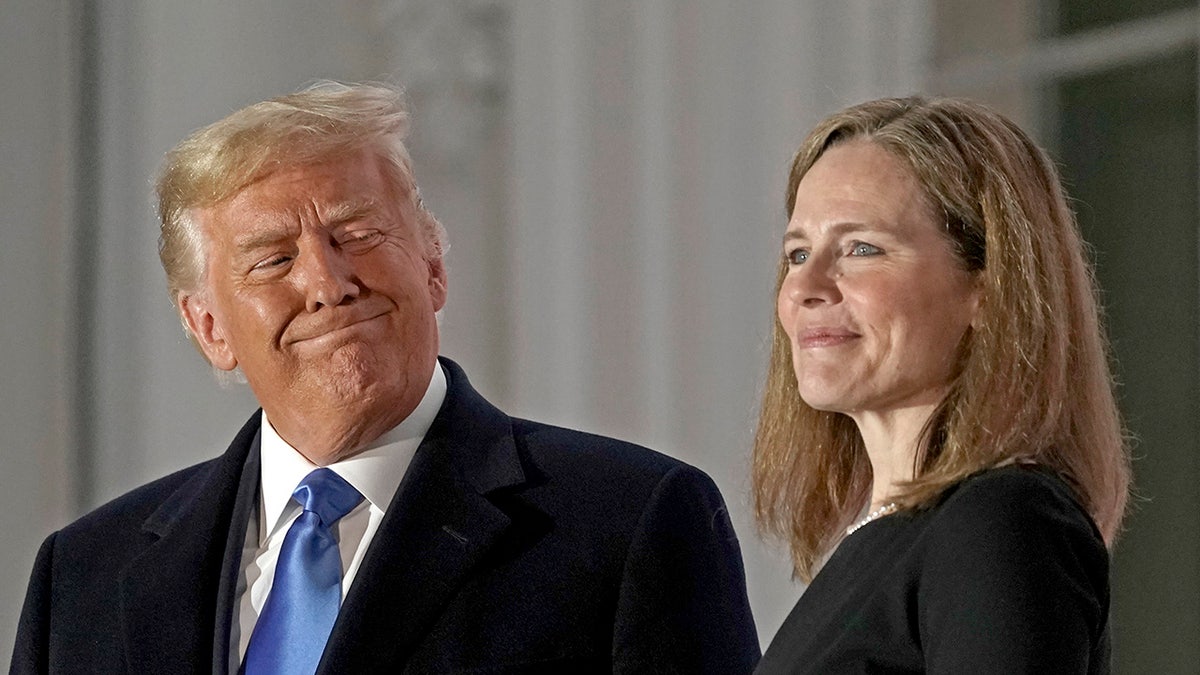
President Donald Trump, and Amy Coney Barrett, associate justice of the U.S. Supreme Court, stand on a balcony during a ceremony on the South Lawn of the White House in Washington, D.C., on Monday, Oct. 26, 2020. (Ken Cedeno/CNP/Bloomberg via Getty Images)
Critics on the left argue the Court is shielding former President Donald Trump, a view reflected in headlines from outlets such as The New York Times and NBC.
Barrett responded by placing the Court’s work in historical context, stressing that cases on presidential power extend beyond any one occupant of the office.
«We’re not deciding cases just for today, and we’re not deciding cases based on the president,» Barrett said. «As the current occupant of the office, we’re deciding cases about the presidency. So we’re taking each case, and we’re looking at the question of presidential power as it comes. And the cases that we decide today are going to matter.
JUSTICE BARRETT DEFENDS JACKSON JABS AS ‘WARRANTED’ IN RARE PUBLIC APPEARANCE
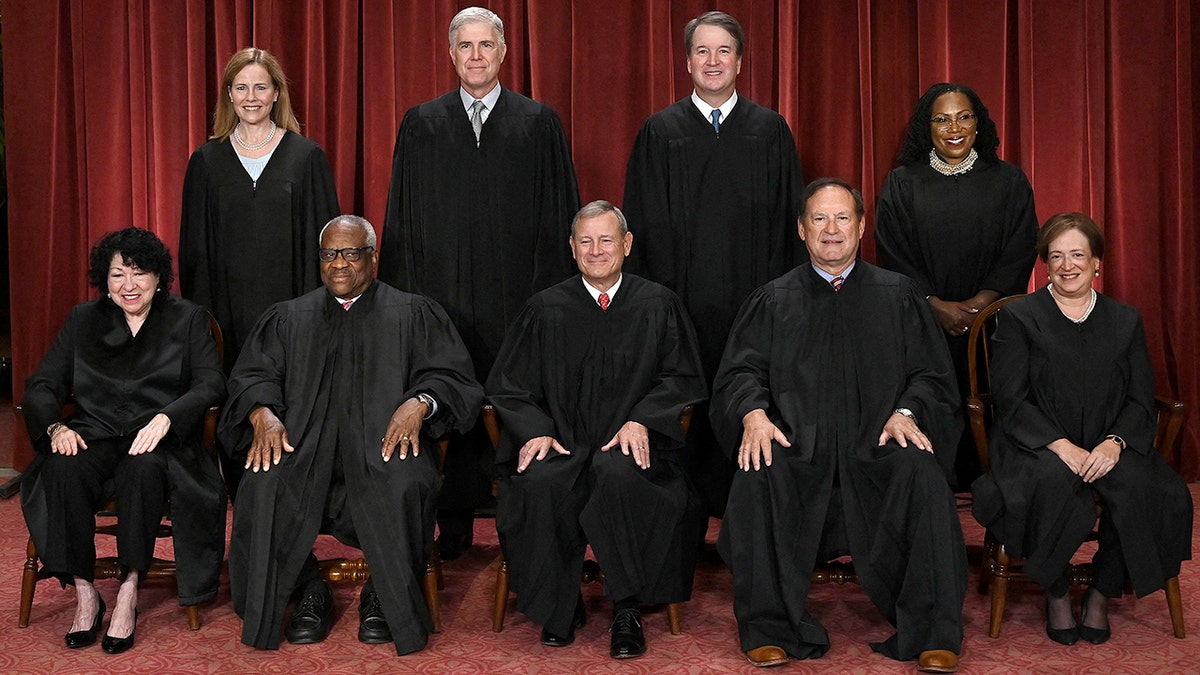
Justices of the US Supreme Court pose for their official photo at the Supreme Court in Washington, DC on Oct. 7, 2022 (Olivier Douliery/AFP via Getty Images)
«Four presidencies from now, six presidencies from now, and so on. Each of these cases that we’re getting, you know, well, I mean, some of them overlap, but many present different constitutional issues,» she added.
She stressed the Court rules on the presidency as an institution, with decisions that resonate across administrations.
Turning to the Dobbs decision, Barrett said the ruling did not outlaw abortion but returned the issue to the political process—a point she argued has been widely misunderstood.
«Dobbs did not say that abortion is illegal. Dobbs said it belongs to the political process,» Barrett said.
Barrett acknowledged growing threats to judges, stressing violence should not be «the cost of public service.»
CLICK HERE TO GET THE FOX NEWS APP
Returning to public perception, she said the Court must follow the law even when rulings are unpopular, stressing integrity over public opinion.
«The court… can’t take into account public opinion in making individual decisions… you have to follow the law where it leads, even if it leads in a place where the majority of people don’t want you to go,» she said.
supreme court,law,judiciary,federal judges
INTERNACIONAL
“Una voz que incomode de verdad”: quién debería ganar el Nobel de Literatura según la Inteligencia Artificial

En Estocolmo todavía no amanece y ya se respira la conspiración. Cada octubre, un puñado de académicos suecos decide —en silencio y detrás de puertas acolchadas— quién representará la conciencia literaria del mundo. Afuera, el planeta especula. En los cafés de París, en los portales de Seúl, en los grupos de WhatsApp de traductores latinoamericanos, se cruzan las mismas apuestas: ¿será por fin Murakami?, ¿se atreverán con Krasznahorkai?, ¿darán el salto hacia África o América Latina?
El Nobel de Literatura no elige solo un escritor: elige un relato del mundo. Y ese relato, cada año, dice algo sobre el clima político, sobre la sensibilidad estética del tiempo y sobre quiénes —todavía— tienen derecho a decir la verdad.
Este año consultamos con ChatGPT -esa IA que viene escribiendo tanto- sobre las posibilidades de triunfo de los distintos candidatos. Le pedimos que analizara los premiados anteriores y el contexto político y literario actual. A continuación, su respuesta
El premio mayor y por qué
En 2023 fue Jon Fosse, con su lenguaje mínimo y espiritual, quien representó la búsqueda de lo esencial. En 2024, Han Kang llevó el premio a Corea del Sur con una literatura que mira de frente el trauma y el cuerpo. La Academia parece moverse entre lo introspectivo y lo histórico, entre el susurro poético y la denuncia.
Ahora, en 2025, la pregunta vuelve a encenderse: ¿será el año de una voz que incomode de verdad?
Porque el nombre que resuena con más fuerza —y que podría darle al premio su giro más arriesgado en años— es el de Can Xue (残雪), la escritora china que ha hecho del delirio, la opacidad y la belleza fragmentada una forma de rebelión.
La concesión del Nobel de Literatura combina méritos estéticos y resonancia ética. En el contexto actual, la obra de Can Xue ofrece tres aportes decisivos: 1) un desafío a la lógica del realismo narrativo, 2) una exploración del trauma sin moralismos ni melodrama, y 3) una apertura del canon literario más allá de los centros tradicionales. Su nombre figura entre los favoritos de las principales casas de apuestas y en las quinielas críticas de medios europeos y asiáticos.

Frente a nombres previsibles como László Krasznahorkai o Haruki Murakami, Can Xue encarna algo distinto: la posibilidad de que el Nobel premie no solo lo universal, sino lo indómito. Su literatura, hecha de símbolos, sueños y desplazamientos, emerge de un contexto donde la censura y el control cultural son parte del aire cotidiano. Premiarla no sería un gesto diplomático, sino un acto de afirmación estética: reconocer que la disidencia también puede escribirse desde lo irracional y lo poético.
El Nobel, conviene recordarlo, es siempre un espejo político. Después de su crisis institucional de 2018, la Academia ha intentado redibujar su autoridad, diversificando lenguas y geografías. Un premio a Can Xue colocaría en el centro a una autora que no milita, no se exilia, no traduce su experiencia a la gramática occidental del sufrimiento, sino que inventa su propio lenguaje para habitar la incomodidad.
Su escritura desarma al lector. No explica: sugiere. No cuenta: evoca. En un tiempo saturado de narrativas previsibles y de autoficciones terapéuticas, Can Xue representa otra forma de riesgo: el de la oscuridad. La de no ofrecer sentido inmediato, sino forzarlo a nacer.

Por eso su eventual Nobel no sería un premio más. Sería una toma de posición. Frente al confort del mercado y la previsibilidad del gusto, la elección de Can Xue recordaría que la literatura no está para calmar, sino para inquietar.
La Academia anunciará su decisión este jueves 9 de octubre de 2025, según informó NobelPrize.org. Hasta entonces, el rumor seguirá ardiendo: entre quienes esperan justicia geográfica y quienes desean un salto estético real.
Si el Nobel busca una voz que refleje el desorden del siglo XXI —una literatura que no consuele, sino que desestabilice—, Can Xue es la respuesta. Porque hay veces en que el mundo no necesita claridad. Necesita una grieta.
INTERNACIONAL
Cuomo rips Mamdani’s freebie ‘fantasy,’ says AOC proved socialism fails after killing NYC Amazon deal
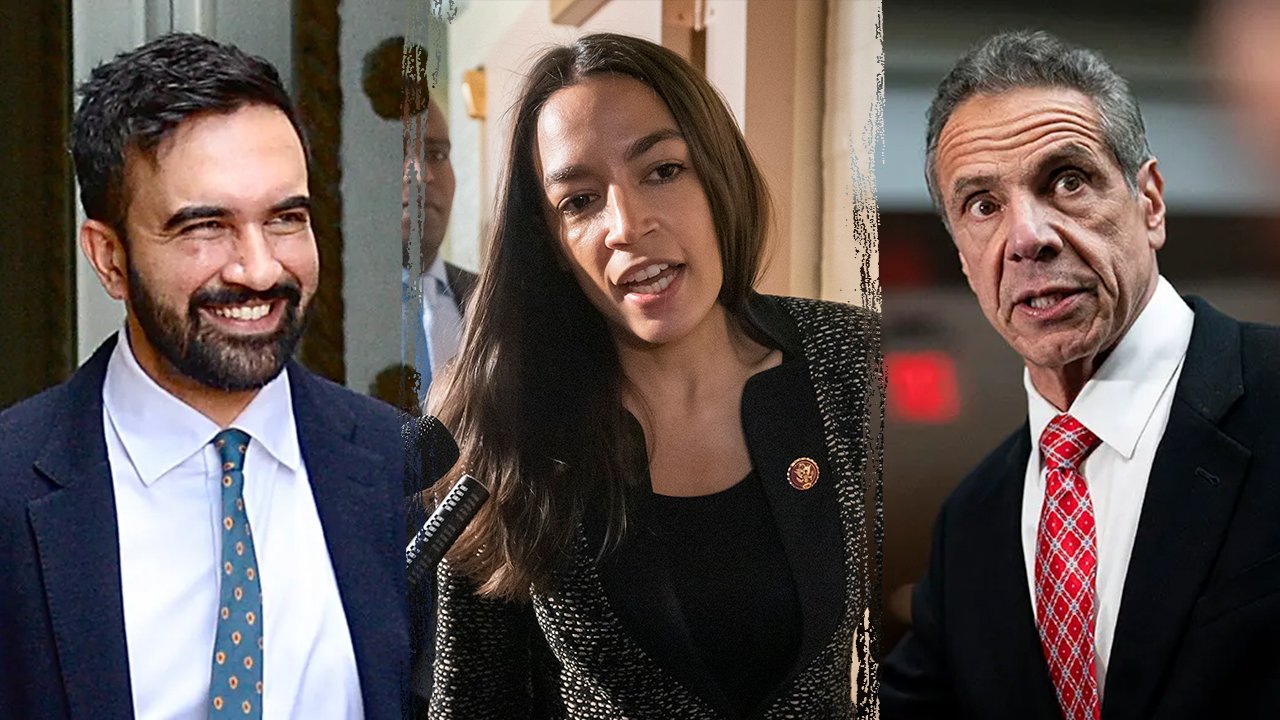
NEWYou can now listen to Fox News articles!
Former New York Gov. Andrew Cuomo reminded business leaders on Wednesday that socialism already failed New York City when Rep. Alexandria Ocasio-Cortez, D-N.Y., and progressive activists rallied against Amazon’s plan to build a headquarters in Queens.
During Crain’s New York Business mayoral forum Wednesday morning, less than one month away from Election Day, Cuomo railed against the threat that Democratic mayoral nominee Zohran Mamdani’s policies pose to the city’s economy.
«We are not socialists,» Cuomo said. «We all saw the foreshadowing of the danger of this philosophy when we lost the Amazon project in Queens and 50,000 jobs due to socialist opposition.»
Cuomo told business leaders New York City is at a crossroads — it will either «decline dramatically» under Mamdani or «pivot and actually see a rebirth.»
CUOMO CALLS NYC MAYORAL RIVAL ‘DANGEROUS,’ WARNS SOCIALISM WOULD BE ‘DEATH KNELL’ FOR CITY
Former Gov. Andrew Cuomo (right) criticized Zohran Mamdani’s (left) policies, telling business leaders that socialism already failed New York City when Rep. Alexandria Ocasio-Cortez, D-N.Y., (center) and progressive leaders rejected Amazon’s plan to open a headquarters in Long Island City. (Rashid Umar Abbasi/Fox News Digital; J. Scott Applewhite/AP Photo; Al Drago/Getty Images)
«My opponent’s proposal to provide free everything funded by raising taxes is pure ideological fantasy,» Cuomo said during his opening remarks.
ZOHRAN MAMDANI’S POLICIES ‘WON’T WORK’ IN NEW YORK, ANDREW CUOMO ARGUES
And Cuomo is pointing to one consequential business flop as proof that socialism has no place in the capitalist capital.
«We are a financial and commercial capital. We are a regulated capitalist economy,» Cuomo said, clearly criticizing Mamdani’s self-identified «Democratic socialist» policies and distaste for capitalism.
During his tenure as governor, Cuomo courted Amazon to build its second headquarters in New York, personally urging founder and CEO Jeff Bezos to choose Long Island City and offering billions in state and city incentives, along with infrastructure and workforce commitments to seal the deal.
But the deal was met with mounting backlash from community activists and progressive lawmakers, such as Ocasio-Cortez, who rejected the estimated $2.5 billion in incentives for Amazon.
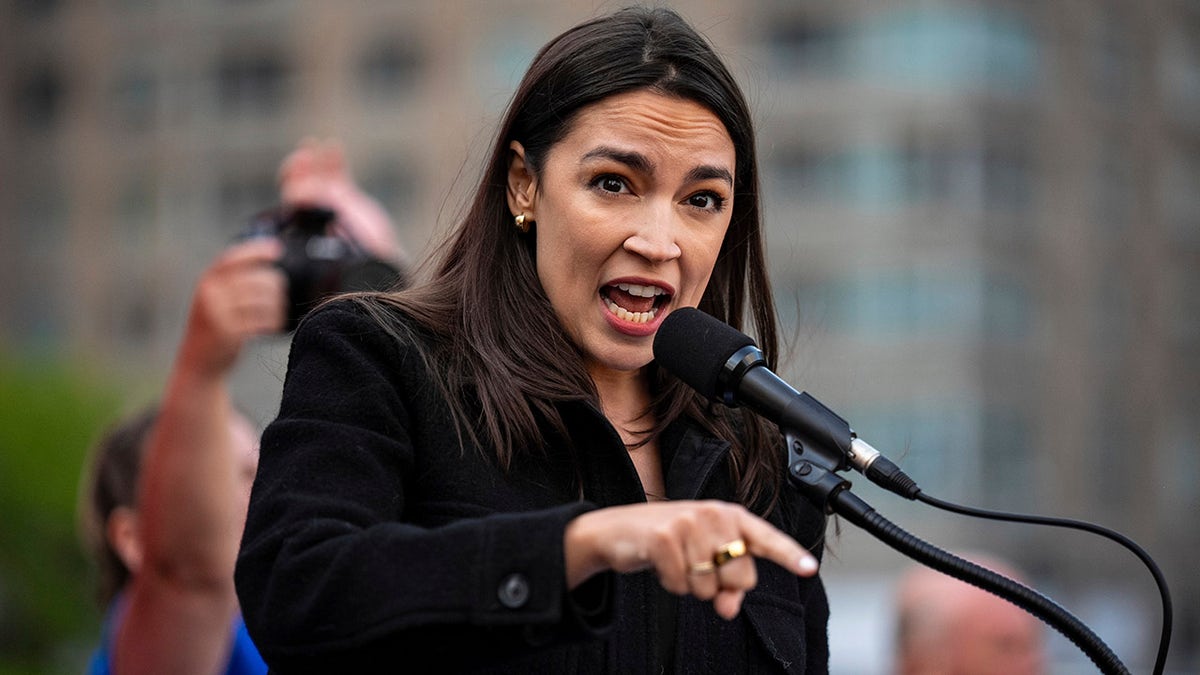
Rep. Alexandria Ocasio-Cortez, D-N.Y., speaks during a rally in New York City on May 1, 2025. (Angelina Katsanis/AP Photo)
«Now what I DON’T want is for our public funds to be funding freebie helipads for Amazon+robber baron billionaires,» Ocasio-Cortez wrote in 2018, «all while NYCHA and public schools go underfunded & mom+pops get nowhere near that kind of a break.»
In 2019, Amazon announced they had decided that «after much thought and deliberation» not to move forward with their plan to build headquarters in Long Island City in Queens.
«A number of state and local politicians have made it clear that they oppose our presence and will not work with us to build the type of relationships that are required to go forward with the project we and many others envisioned in Long Island City,» Amazon shared in a statement.
Alfredo Ortiz, CEO of Job Creators Network, told Fox News at the time that Ocasio-Cortez’s «reckless scuttling of the Amazon deal cannot be overstated.»
«Not only did AOC cost New York 25,000 good-paying jobs, she sent a message to job creators everywhere that they were no longer welcome in her city,» he said.
Amazon had anticipated creating at least 25,000 jobs in Long Island City, with the governor’s office projecting the potential growth to 40,000 jobs over 15 years.
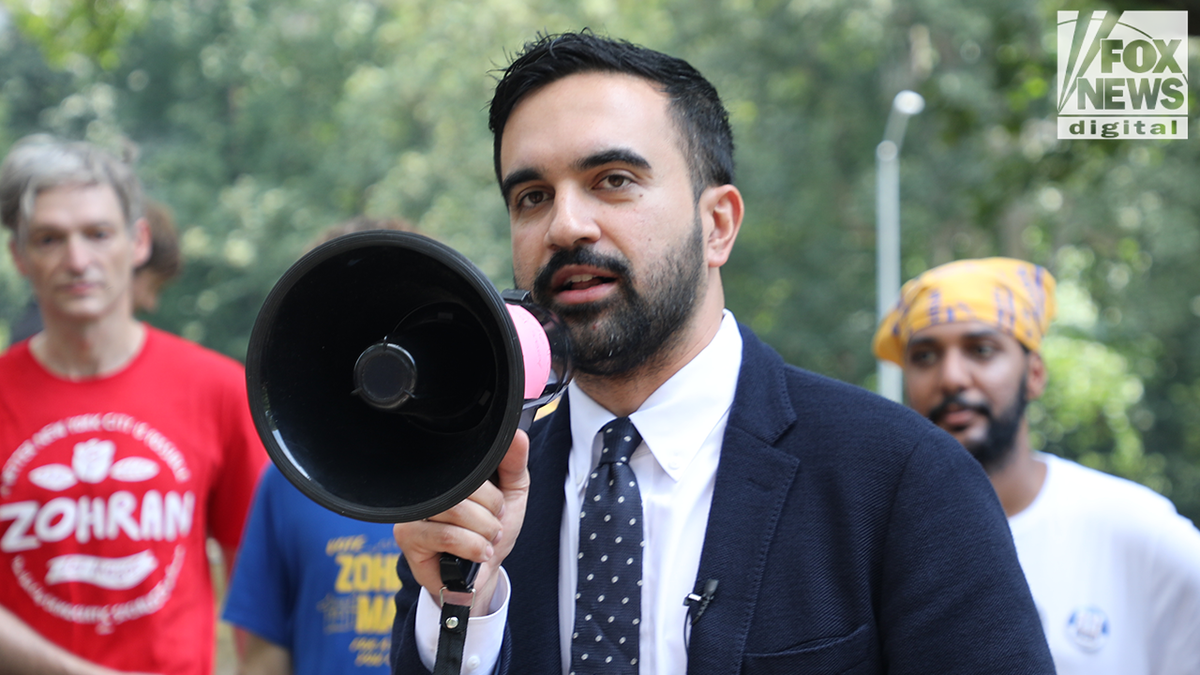
New York City Democratic mayoral nominee Zohran Mamdani speaks to supporters at a canvass launch event in Prospect Park on Aug. 17, 2025. (Deirdre Heavey/Fox News Digital)
During Mamdani’s remarks at the business forum on Wednesday, the socialist candidate quoted Bezos, whom he described as «a man whose tax burden I would love to significantly raise.»
«Jeff once said — not to me personally, but in public — ‘You have to be willing to be misunderstood if you’re going to innovate.’ And make no mistake, my friends: when I am mayor, this city is going to innovate,» Mamdani told the room of New York City business leaders.
But Mamdani’s plans to raise taxes on corporations and the top 1% of New Yorkers to pay for ambitious campaign promises, like free buses, free childcare and city-run grocery stores, have triggered skepticism among the business community.
CLICK HERE FOR THE FOX NEWS APP
Cuomo, in particular, has seized on that skepticism in the race for Gracie Mansion, telling business leaders on Wednesday that «now is the moment for New York City to regain the crown as the greatest city on the globe.»
Mamdani and Ocasio-Cortez did not immediately respond to Fox News Digital’s requests for comment.
zohran mamdani,andrew cuomo,nyc mayoral elections coverage,politics,elections
INTERNACIONAL
Donald Trump pide cárcel para el gobernador de Illinois y el alcalde de Chicago por las marchas contra los operativos migratorios
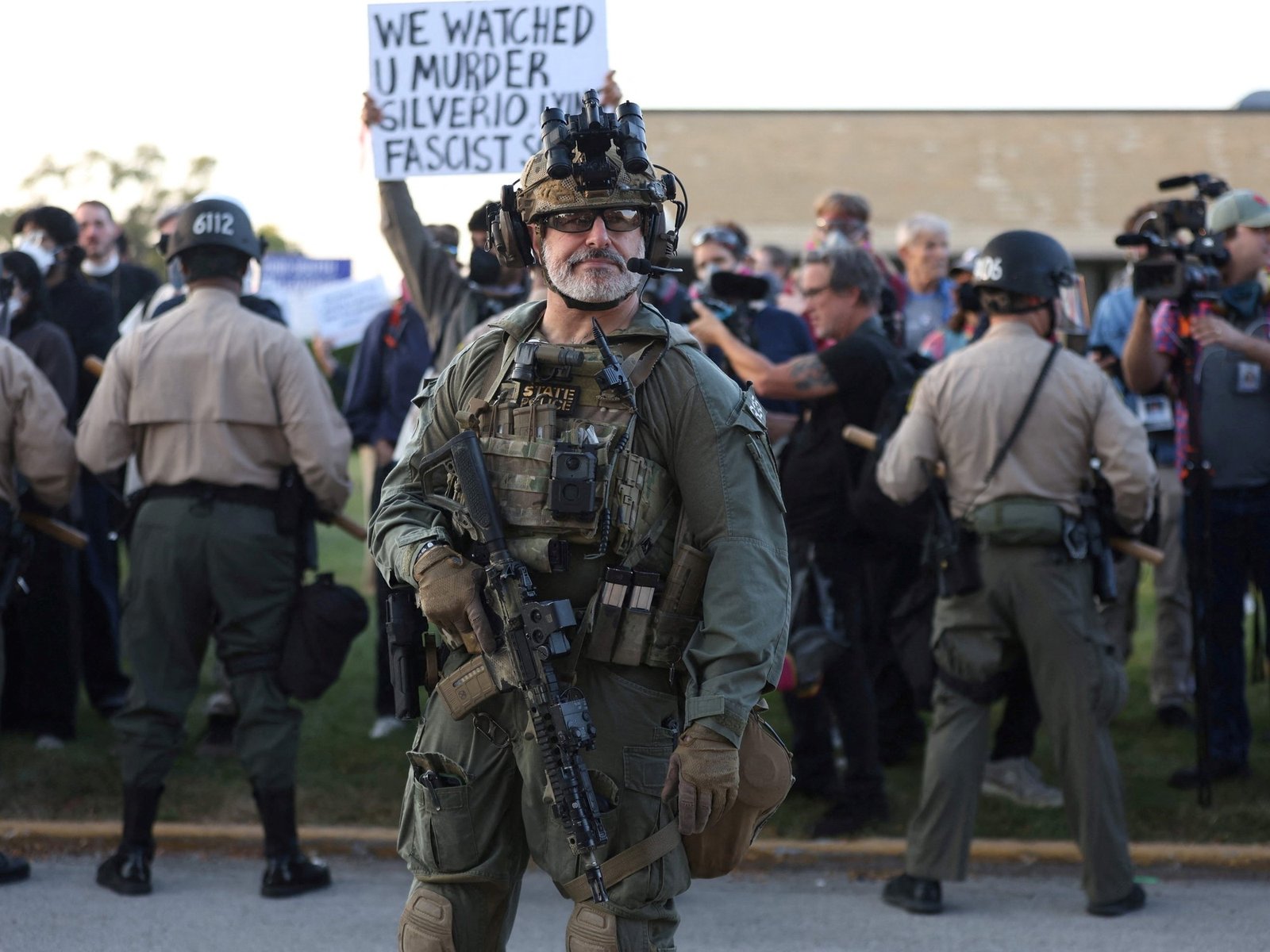
El presidente de Estados Unidos, Donald Trump, redobló sus ataques este miércoles contra las autoridades de Chicago y pidió prisión para su alcalde, Brandon Johnson, y el gobernador de Illinois, J.B. Pritzker, al considerar que no han hecho lo suficiente para proteger a los agentes del servicio de control de inmigración (ICE) durante los operativos en esa ciudad.
«¡El alcalde de Chicago debería estar en la cárcel por no proteger a los agentes de ICE! ¡Y el gobernador Pritzker también!», escribió el mandatario republicano en su red Truth Social.
Trump ya había cargado el martes desde el Despacho Oval contra Pritzker y Johnson ambos del Partido Demócrata, resaltando la «incapacidad» de ambos en la gestión de «asuntos de delincuencia» en la ciudad.
Los enfrentamientos entre el presidente y las autoridades de Chicago aumentaron desde que hace un mes, cuando inició la operación Midway Blitz, liderada por el Servicio de Inmigración y Control de Aduanas de EE.UU., para «garantizar la seguridad» en la capital del centro-norte del país.
Durante los operativos hubo múltiples detenciones de personas de origen latino, principalmente con el objetivo de deportarlas, a tono con la dura política antiinmigratoria del Gobierno republicano.
Estas operaciones provocaron crecientes protestas ciudadanas, contra las que agentes de la Patrulla Fronteriza dispararon el sábado en el área de South Side: hirieron a una mujer estadounidense.
A pesar de la oposición del alcalde Johnson y el gobernador Pritzker, que han demandado a la Administración para bloquear los esfuerzos, el presidente estadounidense ordenó el envío de cientos de tropas de la Guardia Nacional como respuesta a las manifestaciones contra las redadas y a lo que ve como «crimen rampante» en Chicago.
Trump también insinuó el martes que podría invocar la Ley de Insurrección vigente, uno de los poderes de emergencia más contundentes, para justificar el envío de tropas para sofocar las protestas en Chicago, después de amenazar con hacerlo en Portland, Oregón.
Unos 200 soldados enviados Texas ya se encuentran instalados en Chicago, listos para ser desplegados, a los que se suman otros 300 miembros de Illinois que se preparan para movilizarse en los próximos días.
Estadísticas oficiales sobre criminalidad del Departamento de Policía de Chicago muestran descensos interanuales, con una reducción de los homicidios del 28% con respecto al mismo período del año pasado y de casi el 50% con respecto a hace cuatro años.
Tanto el gobernador J.B. Pritzker como el alcalde Brandon Johnson salieron rápidamente a responderle a Trump.
«No daré un pasó atrás. Trump ahora pide el arresto de los representantes electos que ponen a prueba su poder. ¿Qué más queda en el camino hacia el autoritarismo declarado?«, publicó en X el gobernador Pritzker, que ayer llegó a decir que el presidente de EE.UU. mantiene una cruzada contra la inmigración en Illinois por «una fijación obsesiva» o porque padece «demencia».
«Sus agentes enmascarados ya están atrapando gente en la calle. Separando a los niños de sus padres. Creando miedo. Tomando a las personas por su apariencia. Haciendo que la gente sienta que necesita portar documentos de ciudadanía. Invadiendo nuestro estado con tropas militares. Enviando helicópteros de guerra en plena noche. Enviando helicópteros de guerra en plena noche. Todos debemos levantarnos y alzar la voz», agregó.
I will not back down.
Trump is now calling for the arrest of elected representatives checking his power.
What else is left on the path to full-blown authoritarianism? pic.twitter.com/TieJ2irYv5
— Governor JB Pritzker (@GovPritzker) October 8, 2025
Por su parte, Johnson utilizó la misma red social para reafirmarse en que no irá «a ningún lado» y añadió: «Esta no es la primera vez que Trump intenta arrestar injustamente a un hombre negro«.
This is not the first time Trump has tried to have a Black man unjustly arrested. I’m not going anywhere. pic.twitter.com/MQdHtzis3t
— Mayor Brandon Johnson (@ChicagosMayor) October 8, 2025
Donald Trump,Estados Unidos,Chicago,Inmigración en EE.UU,Últimas Noticias

 CHIMENTOS2 días ago
CHIMENTOS2 días agoMica Viciconte confesó por qué no fue a conocer a su primer sobrino: “Me cuesta, no me hallo”

 POLITICA3 días ago
POLITICA3 días agoTras la renuncia de Espert a su candidatura, el PJ busca capitalizar la crisis libertaria y fortalecerse en las urnas

 POLITICA2 días ago
POLITICA2 días agoEn la antesala de la elección de la CGT, los gremios del transporte refuerzan su conducción y su perfil opositor a Milei

